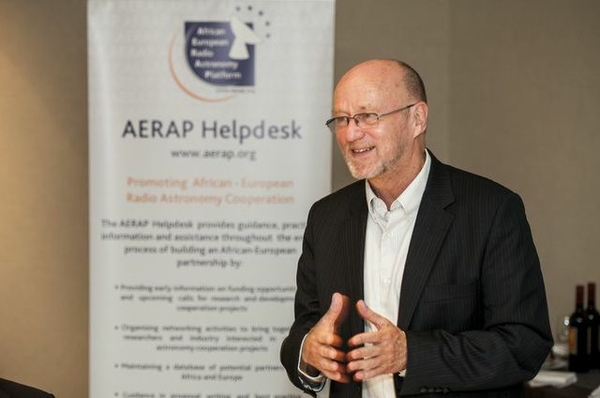News
22-04-2013The Future of South Africa- a Hub for Science and Astronomy

Brussels, April 22nd – Derek Hanekom, the South African Minister for Science and Technology was in Brussels last week for a series of strategic engagements with EU policy- and decision-makers aimed at strengthening cooperation in science, technology and innovation between South Africa and the EU.
During his visit, the African-European Radio Astronomy Platform (AERAP – www.aerap.org), which is working to advance mutually beneficial cooperation in radio astronomy between Africa and Europe, hosted a high-level dinner in honour of Minister Hanekom.
The theme of the dinner was science capacity-building in Africa. Senior representatives of several European Commission services and European research funding organisations joined the Minister in an informal exploration of how Africa’s research and innovation capacities could be fostered through enhanced partnership with the European Union. These discussions specifically interrogated the role cooperation in radio astronomy could play to advance science capacity-building in Africa. Following its presentation, participants also commented on the draft AERAP Framework Programme, which identifies priority initiatives for Africa-EU radio astronomy cooperation.
Minister Hanekom was appointed as Minister of Science and Technology in October 2012. He had been serving as South Africa’s Deputy Minister of Science and Technology since 2004, and had been intimately involved in Africa’s successful bid to co-host the Square Kilometre Array (SKA – www.skatelescope.org), which will become the world’s largest radio telescope. On the positive impact of Africa’s co-hosting of the SKA, Minister Hanekom said in an interview in Brussels,
“In general SKA project is very well-known in South Africa. I don’t think anything we’ve ever done in the area of science and technology has generated as much excitement. The project promotes greater public understanding and awareness of science and technology.”
The development of large-scale radio astronomy facilities can be a powerful driver of socio-economic development in Africa. Preparations for co-hosting global projects such as the SKA are boosting the continent's human capital by training a new generation of highly qualified scientists, engineers and technicians.
On this point Minister Hanekom said while in Brussels, “Developing human capital for science and technology, is a policy priority of the utmost importance in South Africa and Africa. Our radio astronomy initiatives are playing an important part to contribute to these objectives and we have seen some exciting results already with students from African countries following post-graduate courses at South African universities and then returning to their countries of origin to establish astronomy courses at local universities.”
The needs of modern radio astronomy will also force the industrial community to experiment and innovate in the fields of radio technology, (renewable) energy, data transmission, wireless communication, sensor technology and advanced materials. This presents exciting opportunities for African-European cooperation.
“We have something to offer in the quest for greater knowledge and understanding and in the processes of discovery and that South Africa will become a destination for scientists and astronomists from all over the world is a source of pride,” Minister Hanekom stated.
Media Enquiries
Jessica Hadjis
ISC Intelligence in Science
Email: jessica.hadjis@iscintelligence.com
Phone: +32 2 88 88 110
Mob: +32 487 163 107
Declan Kirrane
ISC Intelligence in Science
Email: declan.kirrane@iscintelligence.com
Phone: +32 2 88 88 109
Editor’s Note
The African-European Radio Astronomy Platform (AERAP) is a response to the calls of the European Parliament, through the adoption of the Written Declaration 45/2011, and of the Heads of State of the African Union, through their decision “Assembly/AU/Dec.407 CXVIII”, for radio astronomy to be a priority focus area for Africa—EU cooperation. AERAP is a new stakeholder forum of industry, academia and the public sector established to define and implement priorities for radio astronomy cooperation between Africa and Europe. The overall goals of the platform are to leverage radio astronomy, advance scientific discovery, improve knowledge transfer and stimulate competitiveness across both continents. The platform will also enable effective dialogue to build a shared vision for international cooperation in radio astronomy.
The Square Kilometre Array (SKA) will be the world’s largest and most sensitive radio telescope with a total collecting area of approximately one square kilometre. The SKA will be co-hosted by Southern Africa and Australia. It is a global enterprise bringing together 11 countries from the 5 continents. The SKA will address fundamental unanswered questions about our Universe including how the first stars and galaxies formed after the big bang, how dark energy is accelerating the expansion of the Universe, the role of magnetism in the cosmos, the nature of gravity, and the search for life beyond Earth.
The SKA Project is led by the SKA Organisation, a not-for-profit company with its headquarters at Jodrell Bank Observatory, near Manchester, UK.
For enquiries about the SKA please contact:
William Garnier
Chief Communications Officer
SKA Organisation
Jodrell Bank Observatory
Lower Withington, Macclesfield,
Cheshire, SK11 9DL, UK
T: +44 (0) 161 306 9613
M: +44 (0) 7814 908 932
www.skatelescope.org
NewsRead the latest news
Coordination is provided by ISC Intelligence in Science as one of the initiators of AERAP, together with the South African Mission to the EU.
Contact: info@aerap.org or +32 2 8888 111

 Search the Website
Search the Website